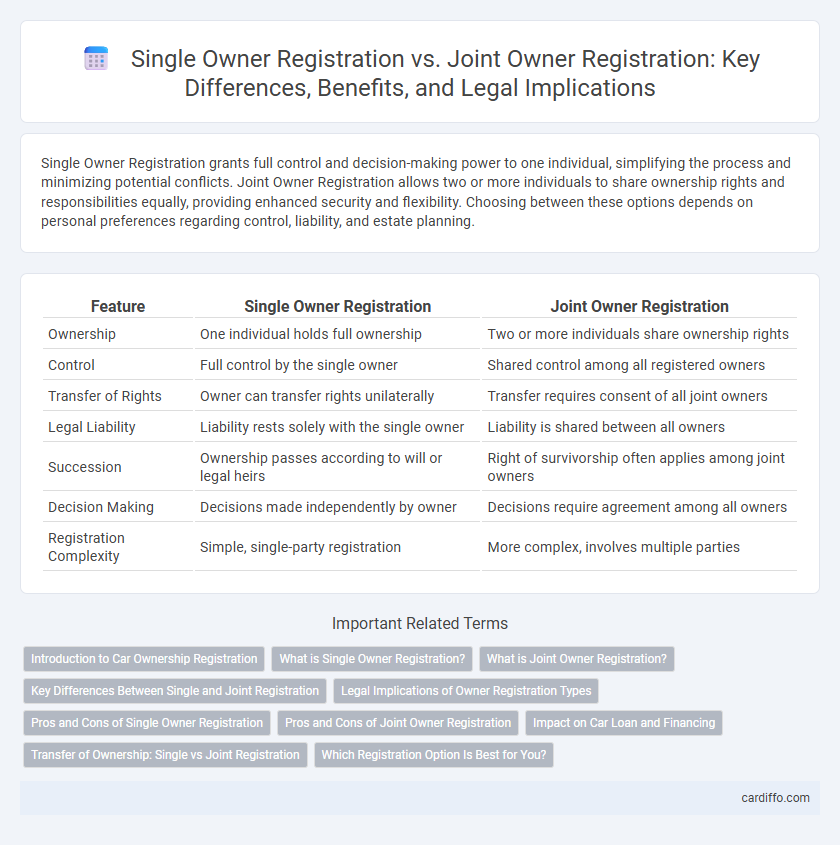Single Owner Registration grants full control and decision-making power to one individual, simplifying the process and minimizing potential conflicts. Joint Owner Registration allows two or more individuals to share ownership rights and responsibilities equally, providing enhanced security and flexibility. Choosing between these options depends on personal preferences regarding control, liability, and estate planning.
Table of Comparison
| Feature | Single Owner Registration | Joint Owner Registration |
|---|---|---|
| Ownership | One individual holds full ownership | Two or more individuals share ownership rights |
| Control | Full control by the single owner | Shared control among all registered owners |
| Transfer of Rights | Owner can transfer rights unilaterally | Transfer requires consent of all joint owners |
| Legal Liability | Liability rests solely with the single owner | Liability is shared between all owners |
| Succession | Ownership passes according to will or legal heirs | Right of survivorship often applies among joint owners |
| Decision Making | Decisions made independently by owner | Decisions require agreement among all owners |
| Registration Complexity | Simple, single-party registration | More complex, involves multiple parties |
Introduction to Car Ownership Registration
Single Owner Registration designates one individual as the sole legal owner of the vehicle, simplifying decision-making and responsibility for the car. Joint Owner Registration includes two or more individuals sharing ownership rights, allowing for shared financial responsibility and legal obligations. Understanding the differences ensures accurate documentation and helps in managing liability, insurance, and resale processes effectively.
What is Single Owner Registration?
Single Owner Registration refers to the process where only one individual is registered as the sole owner of a property or asset, ensuring exclusive control and decision-making rights. This type of registration simplifies legal documentation and transfer processes since all rights and responsibilities lie with a single entity. It is commonly used when one person solely finances or acquires the property without sharing ownership stakes.
What is Joint Owner Registration?
Joint Owner Registration refers to the process of registering an asset, property, or account in the names of two or more individuals simultaneously, granting equal ownership rights and responsibilities to all parties involved. This type of registration ensures that each joint owner has legal authority to use, manage, or transfer the asset independently or collectively, depending on jurisdictional rules. Commonly used for real estate, bank accounts, and vehicles, joint ownership simplifies succession planning and provides shared access and control.
Key Differences Between Single and Joint Registration
Single owner registration grants exclusive control and legal responsibility over the property to one individual, simplifying decision-making and transfer processes. Joint owner registration involves two or more parties sharing ownership rights, often with equal shares, which can provide benefits such as shared financial burden but complicates decisions requiring unanimous consent. Tax implications, liability for debts, and rights to transfer or sell the property differ significantly between single and joint registrations, impacting estate planning and creditor claims.
Legal Implications of Owner Registration Types
Single owner registration grants exclusive legal rights and full control over the property, simplifying decision-making but increasing individual liability and responsibility. Joint owner registration distributes ownership rights among multiple parties, ensuring shared responsibility and protection against unilateral decisions, though it may complicate legal processes such as selling or mortgage approval. Legal implications vary based on jurisdiction, requiring careful consideration of estate planning, tax consequences, and dispute resolution mechanisms tied to each registration type.
Pros and Cons of Single Owner Registration
Single Owner Registration offers streamlined decision-making and full control over property transactions, making it easier to manage without requiring consensus from co-owners. However, it places sole responsibility for financial obligations, such as mortgage payments and taxes, entirely on one individual, which can increase personal risk. While inheritance and transfer procedures may be simpler, the lack of shared ownership limits flexibility in leveraging joint resources or credit.
Pros and Cons of Joint Owner Registration
Joint Owner Registration offers shared control and legal rights over the property, allowing multiple individuals to make decisions and access the asset. It provides protection in case of the death of one owner, as ownership automatically transfers to the surviving co-owners without probate. However, conflicts may arise due to differing opinions, and transferring ownership requires consent from all registered owners, potentially complicating transactions.
Impact on Car Loan and Financing
Single owner registration typically simplifies the car loan approval process, as the lender evaluates the creditworthiness of one individual, potentially leading to faster financing decisions. Joint owner registration may allow combined incomes to support higher loan amounts or better interest rates, but requires agreement from all parties and could involve more complex credit assessments. Loan liability in single ownership rests solely on one person, whereas joint ownership shares financial responsibility, impacting credit scores of all registered owners.
Transfer of Ownership: Single vs Joint Registration
Transfer of ownership in single owner registration involves a straightforward process where only one individual's consent is required, streamlining legal documentation and reducing potential disputes. In contrast, joint owner registration necessitates the approval of all registered owners for any transfer, ensuring shared control but potentially complicating and delaying the ownership transition. This distinction impacts the efficiency, legal clarity, and flexibility in transferring property rights between parties.
Which Registration Option Is Best for You?
Single Owner Registration offers streamlined control and simplified decision-making, ideal for individuals seeking full authority over their assets. Joint Owner Registration provides shared ownership and equal rights, beneficial for couples or partners wanting mutual access and survivorship benefits. Choosing between these options depends on your need for autonomy versus collaborative management and the specific legal protections desired.
Single Owner Registration vs Joint Owner Registration Infographic

 cardiffo.com
cardiffo.com